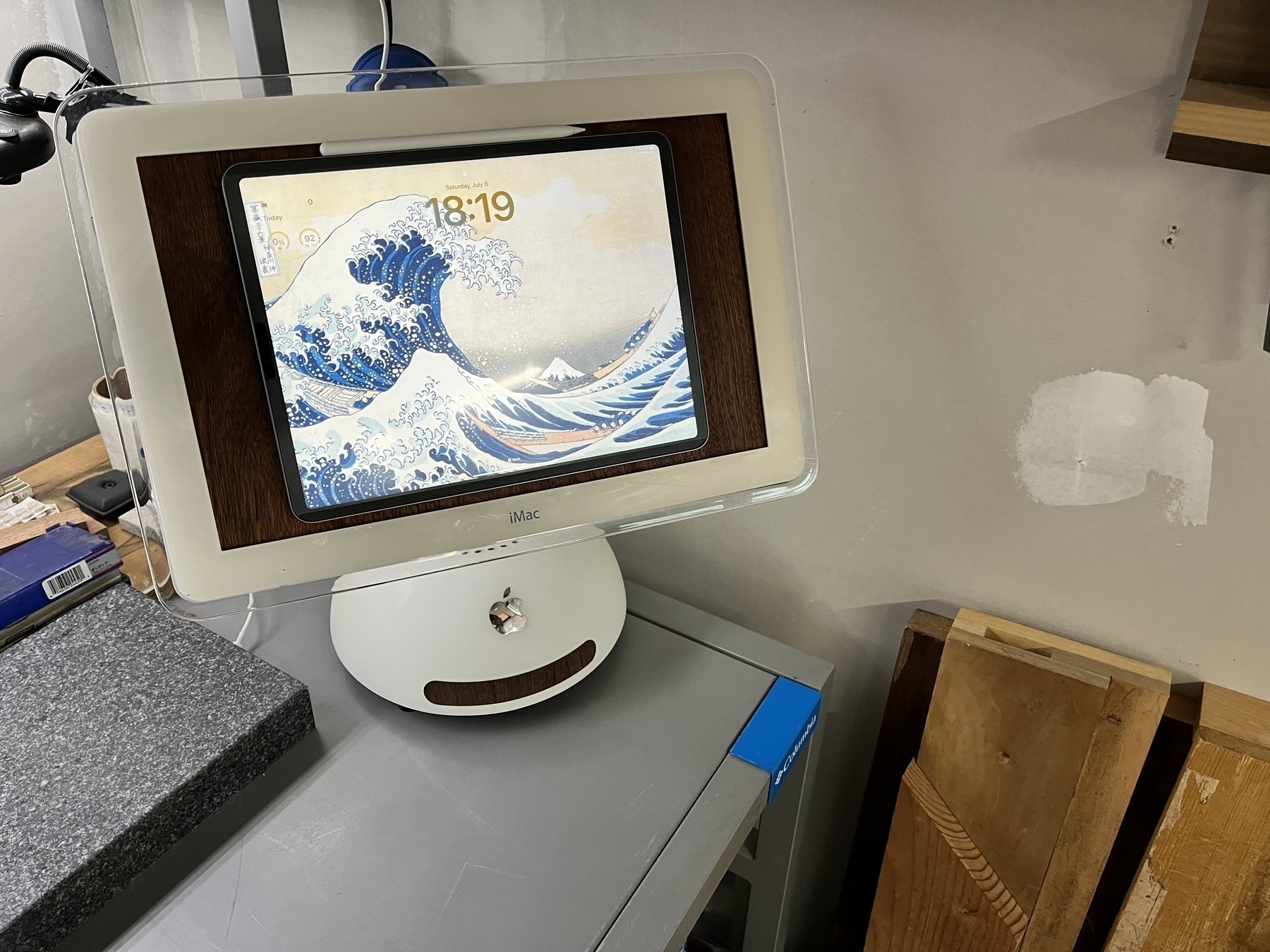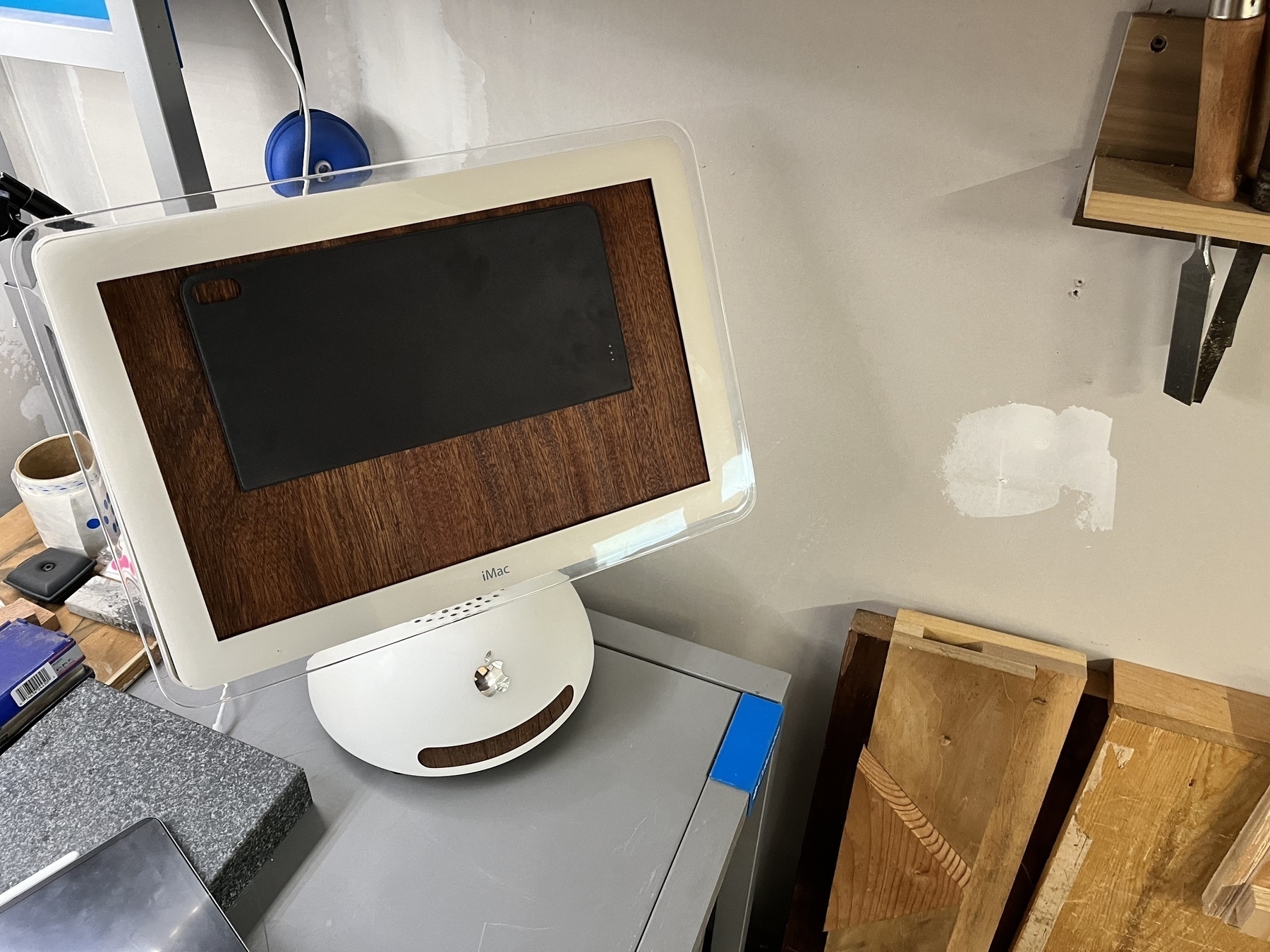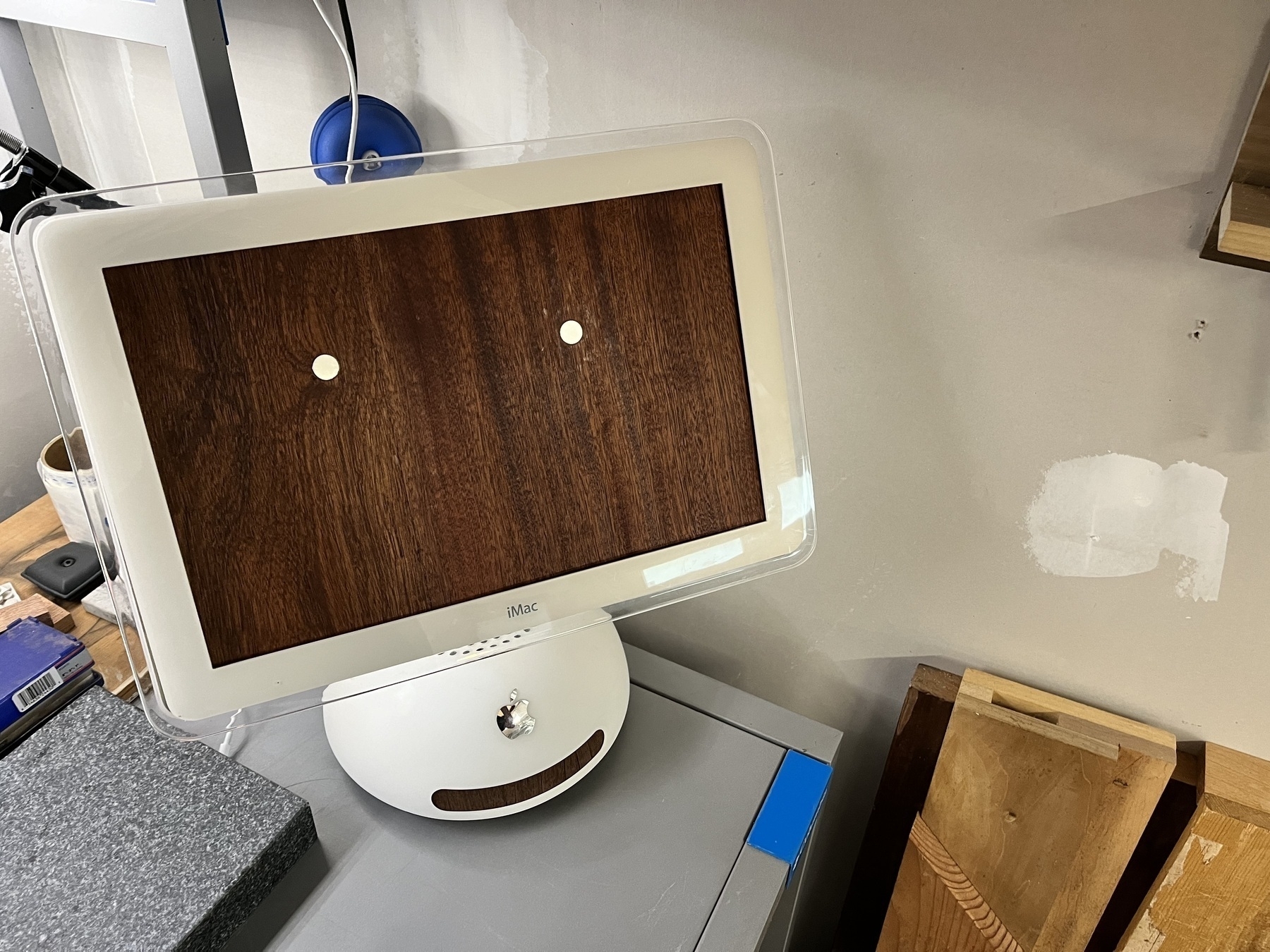As I wait for Copa America to start, I want to look at South America. In Google Maps, with search … easy. In Apple Maps, I gave up trying to do it using search terms.
-
-
2002 iMac converted to iPad Pro Stand

I completed a side project to repurpose my old 2002 iMac into a stand to hold my iPad Pro for when I’m in my workshop. The base is completely gutted so I had to weight it so it balanced correctly. The iPad is held in place by another repurposed thing: an old iPad Smart Keyboard case that I cut down to size so it is only the magnetized part. Strong, small magnets are attached on the back of this case that connect up to magnets embedded in the sapele wood where the monitor used to be. So I can remove the iPad and the case.
The drive slot is wood veneer — I discovered there is just enough of a gap between the plastic body and the underlying metal frame to slide the veneer strips in to make for a nice presentation. I use my iPad in the shop for entertainment and planning projects, so I can grab it when I’m designing then hang it up here out of the way when I just want music or to watch the occasional video.
I’ve been lugging this old iMac around for decades just to someday do something interesting with it, because I love this design. So this is that. On a side note, I think the design of the iMac arm, and this design generally, is genius. Hope to see a modern version of a tilt and swivel arm used in some Apple product in the future.


-
Future of Podcasts
Mike Elgan wrote an interesting piece on Cult of Mac recently that lays out a possible path forward for Apple with regards to the humble podcast. If you haven't heard, it appears that Apple will break podcasts out into a separate app with the release of iOS 6. This will help to lighten up the iTunes app, which is arguably a bit crowded and unwieldy. That's a good thing, but what will become of the podcast? It could go the way of iTunesU, which was stripped out of the iTunes app not too long ago and is now offered as an optional download. That's what we could call the 'demotion to obscurity' path. As Elgan points out, this made sense for iTunesU because the user base for lectures is narrow. For podcasts, however, such a move might signal that Apple doesn't really care about the podcast medium, choosing instead to focus only on content that makes them money. It might, in short, spell the beginning of the end for the podcast. In less dire terms, it certainly wouldn't help podcast listenership to grow beyond a relatively small but enthusiastic group of people.
An alternative path might feature a new iOS 6 podcast app that is installed by default with iOS 6, forming the centerpiece of a new content strategy for Apple that combines free podcasts with paid audio. This is Elgan's speculation, and I think he's on to something. He essentially says that such a strategy could herald a new dawn for podcasts, in which Apple sets the stage to compete with Audible (by wrapping in Apple audiobooks with the podcast app and cutting ties with Amazon's competing Audible service); integrate podcasts and other audio content with car stereos employing Siri control (because that's where a lot of people listen to audio); and adopt the name 'iPodcasts' or 'iPodcast' to brand the new app (which, Elgan surmises, might give Apple more footing to go after companies profiting by using the word 'pod' in their products and services).
As it now stands, podcast enthusiasts (like me) mostly feel that Apple thinks little of podcasts. In iTunes terms, the podcast is one step up from the 'Radio' category. When was the last time you used that feature? It's a shame, because podcasts serve up consistently great and varied content. I currently subscribe to 41 podcasts. For years, I relied on iTunes for podcast content. And, for years, I've cursed at how poorly iTunes manages podcasts and fails at helping people discover great shows.
Recently, I switched from iTunes to so-called 'podcatcher' apps. I purchased iCatcher! and Downcast and tried each out for several weeks. I would recommend them both, really. They are solid apps. Having said that, I'm currently using Downcast as my podcatcher of choice because it's a bit more polished and syncs faster across devices via iCloud. What do podcatcher apps offer over iTunes? Well, syncing across devices for starters. I can stop listening to a podcast on my iPhone and pick up where I left off on my iPad. I can download podcasts (of any size) over 3G. I can manage my podcasts by playlist. I enjoy automatic, untethered podcast updating over WiFi. I could go on. Suffice it to say that Apple's podcast offerings pale in comparison.
If Apple does stake a claim on 'iPodcast' and rolls out a new app this Fall that consolidates both free podcast and paid spoken word content, it would surely be a good thing for the future of the podcast. Of course, it could also mean that apps like Downcast and iCatcher will soon be Sherlocked. And it could also mean that fewer and fewer podcasts would be free in the future, as this might give podcast producers an easy way to charge for episodes without creating stand-alone apps. Who knows. What I do sense is that, as a consumer and producer of podcasts and big fan of spoken word content, this medium is undervalued and underappreciated.
-
On Apple
A few loosely-formed notes related to Apple's latest announcements:- The Retina Macbook Pro is lovely. I'm not planning on purchasing it, though. If I were going to get it, I'd spring for expensive upgrades (16 GB of RAM, largest hard drive), as I've read that there is apparently no way to upgrade this machine. I also have a more existential concern: if were to buy a Retina laptop, would I still be able to tolerate my crappy external monitor?
- The $20 upgrade fee to install Mountain Lion on all your Macs is a good deal.
- I'm lamenting the unmistakable signs that the desktop hierarchical file system is going the way of the floppy drive. App libraries are in, in which each app houses its own files and data, iOS style. I suspect that, within the next iteration or two of OS X, the file system will join Console, Terminal, and Activity Monitor in the utility bin. And as with most Mac utilities, it probably won't be used by many. Still, as long as access to the file system remains, I'll be OK.
- Here's one thing that worries me about app libraries. A lot of people organize files on the Mac by topic, not by app. For example, I have documents (created with many different apps) that are related to my house that I've tagged and filed away in one place. How will a walled-in app library solution allow me to organize documents across apps? Maybe a tagging solution will be offered. And what of plain text files, which may be opened and manipulated by scores of iOS and desktop apps? That's the beauty of the flexibility of Dropbox text file storage. It's so very flexible.
- Speaking of files, I love my PathFinder. And EagleFiler. And Launchbar. With every OS X release, my insecurity grows about the future of these and many other desktop apps. Imagine how the developers feel.
- Every time I see more iOS features come to the desktop, I can't help but think, 'Winter is coming!'
- Apple demos of new OS features are consistently drool-worthy and slick, but they need to help us users more in terms of follow-through. My point is that Apple could do a much better job in documenting how to use their apps and operating systems. Updates come fast and furious, but new features and usage scenarios are poorly documented.
- I'm surprised that Apple has yet to offer a better password solution for logging in to web-based accounts across devices. Stated another way, I'm surprised that Apple hasn't yet Sherlocked 1Password. Couldn't you see Apple offering a password solution that syncs across your Mac(s) and devices via iCloud, but only works with Safari to encourage browser lock-in. Speaking of, does anyone know of a site that lists all third party apps that have been Sherlocked over the years?
- Passbook looks promising. I hope it expands to include supermarkets, chain stores, and gas station membership bar codes. It's the 21st century. Why do I still need a Petco plastic dongle on my car keychain?
- What of Dragon Dictate? Curious that I received a newsletter from Nuance for the first time in a long while on the day of the WWDC keynote offering a special discount to buy Dictate for Father's Day. And I received another similar email today. So I'm wondering if the new OS X dictation feature will obviate the need for Dragon Dictate ... or if this product will differentiate itself by offering a more robust voice-recognition package for Mac. I should note that I'm a happy Dragon Dictate user.
- Facebook integration thoughts: blah. I'm not a fan.
- Siri's new ability to open an app by name isn't enough. What if I don't remember the name of the app? This is a good step forward, but we need more and better ways to navigate our hundreds of iOS apps. By keyword, for example. Wouldn't it be nice to ask Siri to serve up all weather-related or board game apps?
- The Mac Pro update was weak. Did you see that the Mac Pro had a little 'new' tag on it in the Apple Store on the day of the keynote? The next day, that notation disappeared ... no doubt because of the deluge of feedback from outraged power users who were expecting a real update. That won't come, apparently, until next year.
- iTunes remains a bloated mess.
- When on Earth is the iWorks desktop suite going to be refreshed?
- iOS, iTunes, iLife, iEverything. Am I the only one who is sick of the 'i' thing?
-
Apple's Last Mouse
I finally broke down and bought an Apple Magic Mouse a couple of weeks back to replace an aging Logitech MX Revolution. I'm happy with my new input device, but I suspect it will be the last Apple mouse I ever buy. That's because I'm convinced that this is Apple's final mouse.
When I first started using it, I thought of the mouse as a hybrid device that cleverly combines old and new input ideas. After using it for a while, I've started to think about it as a transitional device. The Magic Mouse isn't about the mouse at all. It's all about the Multi-Touch surface.
My guess is that Apple will soon proclaim the mouse dead and drop it from their product line. Only the Magic Trackpad will remain for desktop computers.
Is the Magic Trackpad a superior input device? Based on my experience using the Trackpad on my Macbook Pro, I'd say it's better for most tasks but not as good for tasks that require fine control. The Multi-Touch, finger-driven interface is great, but it would be even better to have a large Trackpad that could transform into a Wacom-style pen tablet device. Perhaps a gesture could toggle modes.
Of course, even touch surfaces may someday be obviated by eye- and voice-controlled desktop computing. I can see how such future tech might work well for routine tasks, but I wager we'd still need some sort of physical input device for precision work (e.g., detailed selections, drawing). I bet that device will look a lot more like a Trackpad than a mouse. It could also look like an iPad running a Trackpad app.